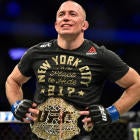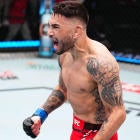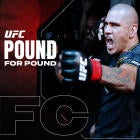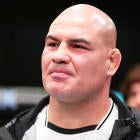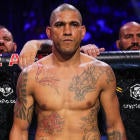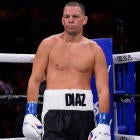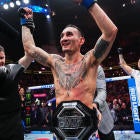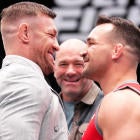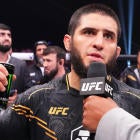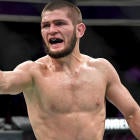In the end, he did it his way and that's how he should be best remembered.
Former two-division champion Georges St-Pierre, the greatest welterweight in UFC history and quite possibly the sport's G.O.A.T., is expected to call it a career on Thursday in a press conference in his native Montreal.
Three months shy of his 38th birthday and unable to secure the type of return bout that will extend his legacy, St-Pierre's decision to eschew a number of big-money pay-per-view options in order to stand by his own principles is very much consistent with how he has handled a legendary career that has spanned 17 years and 28 fights.
Can't get enough UFC? Subscribe to my podcast State of Combat with Brian Campbell where we break down everything you need to know in the Octagon.
St-Pierre (26-2) will rightfully be lauded for a number of historical achievements that helped define his legacy. He's one of six fighters to win a UFC championship in two weight classes. His nine title defenses are the most in welterweight history. His 20 UFC wins are tied for second overall and he holds company records for most takedowns (90) and wins in a title bout (13).
GSP is also considered by many to be the greatest wrestler in MMA history and evolved from a pressure fighter upon his initial rise to find incredibly longevity by controlling his opponents on the ground and with his jab while efficiently suffocating their offense. In many ways, he's the first true mixed martial artist on the elite level in UFC history considering he didn't master a single discipline before evolving into a complete fighter.
Yet it's hard to get away from the idea that GSP, who lived up to the bushido code as well as any fighter in history, best defined his own legacy by how he carried himself and the decisions he made. In an era where trash talk became the currency to become a PPV star, St-Pierre largely stayed away (and was even respectful to almost a comical level the rare times he tried).
Unable to land a super fight against unbeaten lightweight champion Khabib Nurmagomedov, in what would've been a risky, dare-to-be-great cut down to 155 pounds for a chance at becoming the first three-division UFC titleholder, GSP chose to walk away. It's the same decision he made in 2013 following a brutal split-decision win over Johny Hendricks when St-Pierre shockingly announced he needed to "take time off" in what became a four-year retirement.
A model of refreshing transparency, St-Pierre never backed away from sharing the reasons for his exit following UFC 167 while at the top of his game at age 32. He was openly critical about the quality (or lack thereof) regarding UFC's drug testing system at the time. He was also concerned about his own health after having admitted to both a bad concussion in the Hendricks fight and years of anxiety that both aided him in maniacally preparing for each bout, yet drove him crazy due to the fear of losing his title.
During his absence from the sport, St-Pierre boldly lent his name to the MMA Athletes Association (MMAAA) in hopes of creating the sport's first organized union and elevating the rights of UFC fighters "to dramatically alter the company's decade plus outrageous treatment of its athletes." GSP also never bent to UFC demands upon his return in a series of decisions that tested the strength of his name and conviction against the company's best wishes.
Despite announcing his return in 2016, St-Pierre took more than a year to prepare his body for a historic move up to middleweight and refused to alter his timeline in the face of company pressure. Even after his comeback fight against then-champion Michael Bisping was announced in March 2017, GSP went on to out UFC's attempt to force him to cover up an injury that eventually delayed the fight until November of that year.
Even St-Pierre's initial return to UFC following his lengthy hiatus saw him stand up for his own principles and business dealings when it was leaked that UFC, which had signed a much-maligned and exclusive apparel deal with Reebok in his absence, had issue with GSP coming back as a fighter who was sponsored by rival Under Armour. After lengthy negotiations, a deal was eventually signed.
Making the case for GSP as the greatest fighter in UFC history comes down to more than just his wins and losses (which include two each over fellow legends BJ Penn and Matt Hughes) or the resiliency he showed in regaining his title in 2007 following a shocking knockout loss to Matt Serra in the biggest upset in promotional history.
St-Pierre not only did it his way, he did it the right way. He respected the sport, his opponents, the fans and why it's important to stand up for one's own convictions. He was and remains a role model for a company just 25 years into its lifespan that still isn't that far removed from its no holds barred, "human cockfighting" and "just bleed" infancy.
As a young boy in Quebec, St-Pierre fell into martial arts as way to escape and overcome bullying in a backstory that has been well-publicized and celebrated as the origin of his UFC rise. In many ways, he never stopped trying to fight for what was right and just, regardless of whether it was the most financially smart decision.
It's because of that why GSP's beloved status is timeless and his legacy immortal.
Make no mistake, Georges, we are all impressed by your performance.












